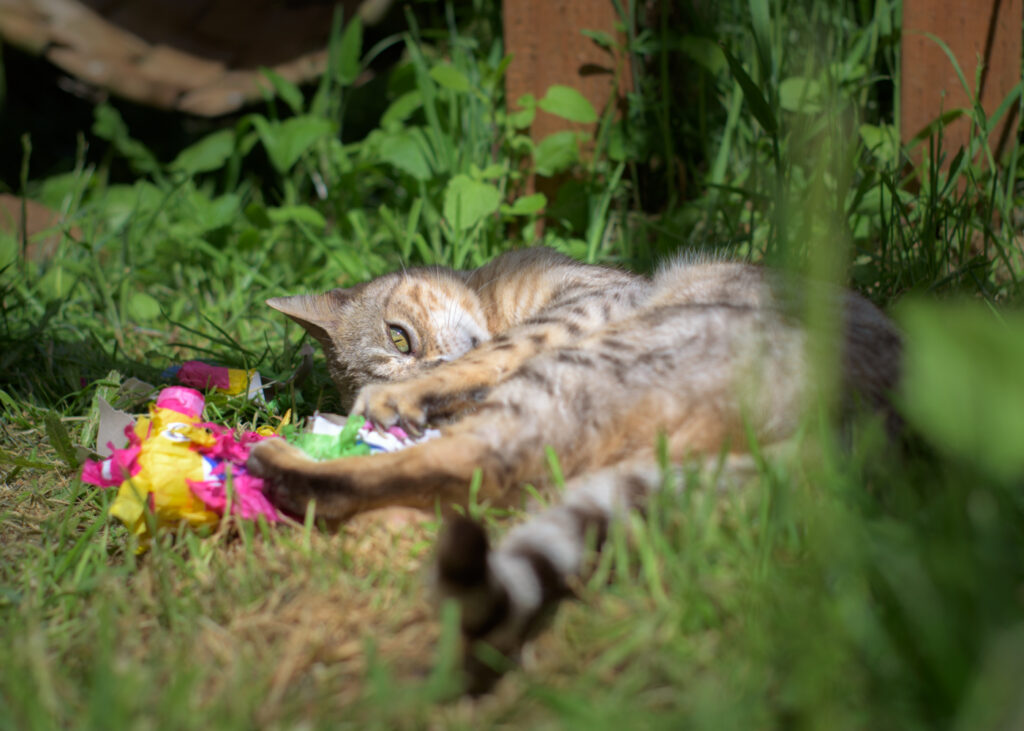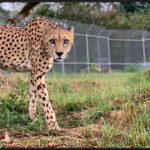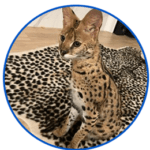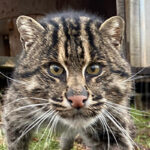What is a Hybrid Cat?
The Keeper Journal
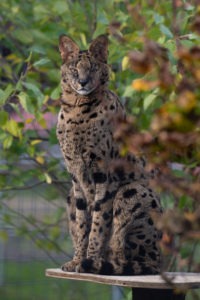
Here at WildCat Ridge, we take in a number of wildcats that used to be owned as pets, including bobcats, servals and the occasional lynx. Sadly, many pet owners believe that since they're "smaller" wildcats, they make the perfect exotic house pet. This is just not true, as they come to find out, and they're quick to try and re-home these animals in places like animal sanctuaries.
In addition to servals and bobcats, we also receive a number of inquiries asking to take in hybrid cats. Hybrids are the result of breeding a wildcat with a domestic house cat; these animals are then advertised as domesticated house pets. But no matter how hard you try, you simply can't take the wild out of a wildcat, even if it's been bred with a tabby.
So what's a hybrid?
Sadly, there are a variety of hybrid cats on the pet market today, tempting owners to invest in a more exotic, larger and unique looking pet. These cats may be anywhere from a first generation (F1) hybrid where one parent was a wildcat, one a domestic cat, to an F3, where the momma cat was an F2 and the father a domestic.
The belief is that the lower the number after the F, the less wild the animal...but we all know that while you might take the cat out of the wild, there's no removing the wild out of the cat. Right, Tut?
Savannahs, bengals and chausies
We currently have three different breeds of hybrids at our animal sanctuary – savannahs, bengals and one chausie.
- Savannah – A savannah cat is the result of breeding a domestic cat with an African serval. While the resulting animal may look as unique as Taji or more like a large house cat, such as Violet or Maxi, their behaviors will likely remain as food aggressive and potentially territorial as a wild serval's. Of course, we do have some savannahs that love some keeper attention, but they remain a force to be reckoned with during breakfast.
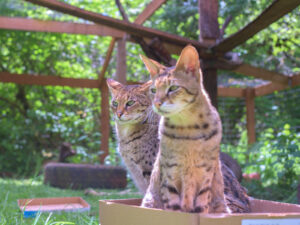
Zuzu and Jersey, savannah cats
- Bengals – Bengal cats are the offspring of a domestic cat and Asian Leopard cat. And while they catch the eye of many want-to-be-exotic-pet owners because of their uniquely spotted coat, bengals have an irreversible instinct to mark their territory by spraying everywhere. While there is plenty of room for all our bengals to mark their territory to their hearts content out here at WCR, it's a good reason why bengals don't belong in a home.
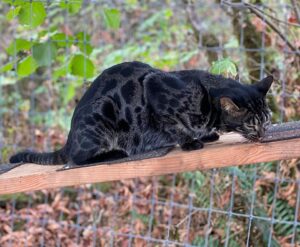
Morpheus, bengal cat
- Chausie – Chausies are a mix of domestic cat and jungle cat (Felis chaus). Only one chausie calls WildCat Ridge home: our beloved Tut. Even though this boy loves cuddles from the keepers, he also loves anything that smells. We frequently find him waist deep in the poop bucket when we're trying to clean litter boxes, and his reputation for spraying on everything (keepers included!) is just one reason why chausies make highly challenging pets.
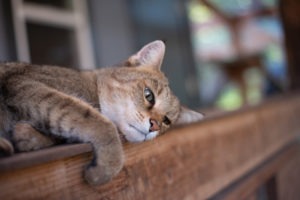
Tut, chausie cat
But no matter their quirks, we adore each of our hybrid cats and find it an important part of our mission to provide them with a comfortable forever home.
Thinking about adopting a hybrid cat?
Trust us when we say, "Think again."
Don't get us wrong, we love each and every one of our hybrids, but we also love each and every one of our tigers and we certainly aren't suggesting they make good pets. Just because an animal is beautiful, exotic or has a great personality, it does not mean that animal belongs in a house. Far from it, in fact.
In addition, many hybrid cats, because they are the product of human experimentation and do not occur naturally in the wild, are born with a number of health complications or genetic defects. This can make life uncomfortable, even painful, for the cats; scary diagnoses and large vet bills are yet another reason why many owners give up on owning hybrids, resulting in an abundance of these animals at sanctuaries like ours.
Support our hybrids, not the exotic pet market
We won't disagree, hybrids are beautiful animals (like, we're all obsessed with Morpheus). However, as long as there is a demand, breeders will continue to supply hybrids, even when a majority of these cats will likely be re-homed or need extensive medical care at some point in their lives.
You can help put a stop to this demand and provide for the wellbeing of all exotic animals by raising your voice against the exotic pet trade, adopting a sweet domestic kitty from your local human society instead or virtually adopting one of our hybrids!
And we thank you for standing with us against the private ownership and breeding of exotic wildcats.
